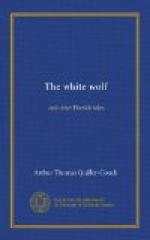The “Parson’s Box” remained, provoking no criticism. He himself had a little plan for its contents. He would spend the money on a journey to his nephew and nieces, if they were anywhere in England. He would find out. There was no hurry, he told himself, with a queer smile.
There was not. The box provoked neither ill-criticism nor effusive charity. On Trinity Sunday, when he opened it and counted out one shilling in silver and sevenpence in coppers, Parson Jack pulled a wry face and then laughed aloud.
II.
Toot—toot—toot!
The postman’s horn in the village street above him shook the Parson out of his idleness, if not out of his dark thoughts. He sprang up, gripped his shovel, and began spading the white river-sand into his sack.
“It is useless, after all,” said he to himself. “The crack on the south of the tower stands still, but the smaller and more dangerous one—the one on the weather side—is widening fast. This winter, even, may finish matters.”
He took up a few more shovelfuls. “Anyhow, it will not last my time; and since it will not—” He paused, as a thought rose before him like a blank wall. If the church fell—nay, when it fell—this comrade which had taken possession of his purposes, his fears, his fate—this enigmatic building of which he knew neither the history nor the founder’s name, but only its wounds—why, then his occupation was gone! He might outlive it for years, perhaps a third of a lifetime; but he had no hopes beyond. In imagination he saw it fall, and after that— nothing. And he laughed—not the laugh with which he had counted out the money in his collecting-box, but one of sheer self-contempt, and passing bitter.
The impression had been so sharp that he flung a glance up at the grey tower topping the grey-green rise; and with that was aware of the postman swinging, with long strides, down the slope towards him.
He turned in confusion and resumed his shovelling. Why was the man coming this way, by a path out of his daily beat? Parson Jack stooped over his work. He wished to avoid greeting him. There was talk, no doubt, up at the village. . . .
But the postman was not to be denied. He stopped and hailed across the stream.
“Hulloa, Parson! I’ve just left a letter for you up at the Parsonage: a long blue letter, and important, by the look of it, with a seal—a man’s hand coming out of a castle. Do you know it?”
“No,” answered Parson Jack. “Did you come out of your way to tell me this?”
“Not quite; though I’d do as much for ’ee any day, out of friendliness. But, tell ’ee the truth, I was sent to seek you with a message.”
“A message?”
“Sir Harry has ridden over from Carwithiel, and wants you up to church. He’s there waitin’ with his nephew, a narra-chested slip of a chap with a square-cut collar and a Popish sort of face.”




